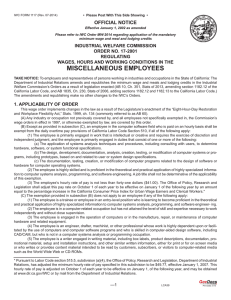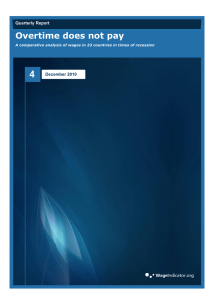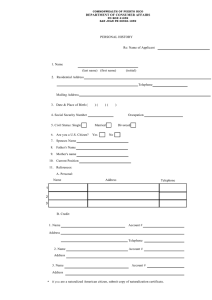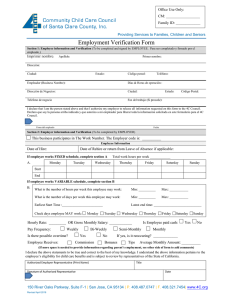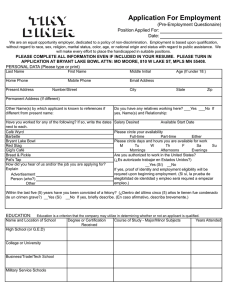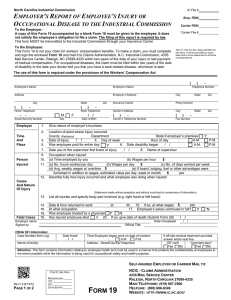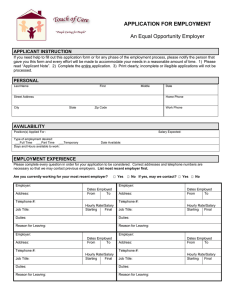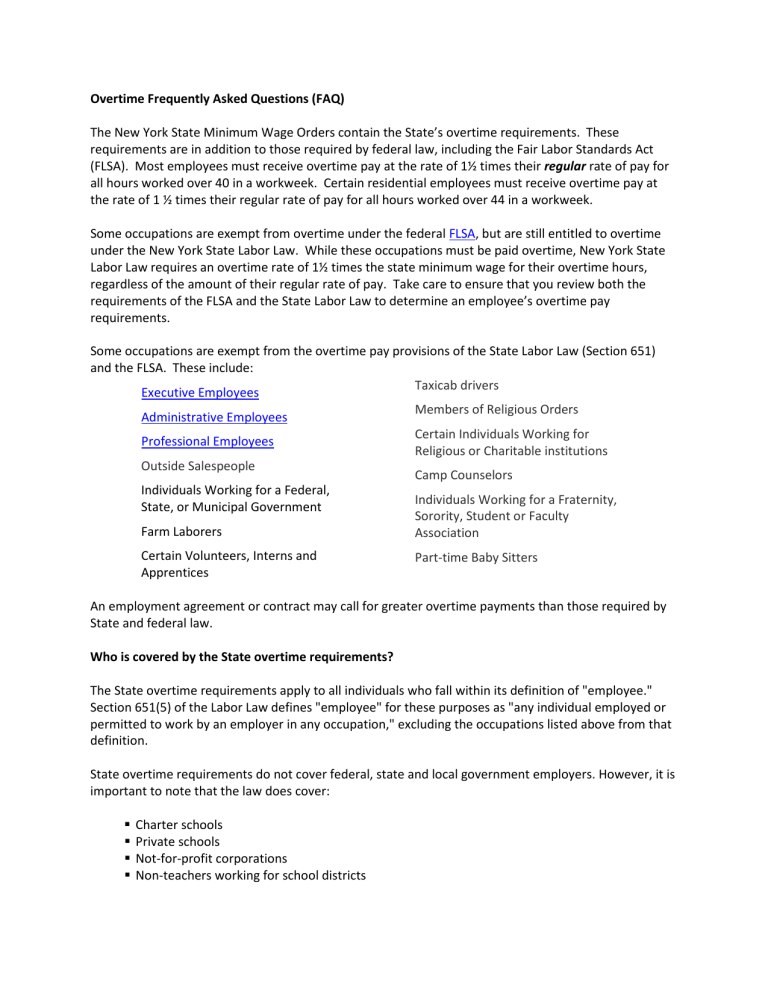
Overtime Frequently Asked Questions (FAQ) The New York State Minimum Wage Orders contain the State’s overtime requirements. These requirements are in addition to those required by federal law, including the Fair Labor Standards Act (FLSA). Most employees must receive overtime pay at the rate of 1½ times their regular rate of pay for all hours worked over 40 in a workweek. Certain residential employees must receive overtime pay at the rate of 1 ½ times their regular rate of pay for all hours worked over 44 in a workweek. Some occupations are exempt from overtime under the federal FLSA, but are still entitled to overtime under the New York State Labor Law. While these occupations must be paid overtime, New York State Labor Law requires an overtime rate of 1½ times the state minimum wage for their overtime hours, regardless of the amount of their regular rate of pay. Take care to ensure that you review both the requirements of the FLSA and the State Labor Law to determine an employee’s overtime pay requirements. Some occupations are exempt from the overtime pay provisions of the State Labor Law (Section 651) and the FLSA. These include: Taxicab drivers Executive Employees Members of Religious Orders Administrative Employees Certain Individuals Working for Professional Employees Religious or Charitable institutions Outside Salespeople Camp Counselors Individuals Working for a Federal, Individuals Working for a Fraternity, State, or Municipal Government Sorority, Student or Faculty Farm Laborers Association Certain Volunteers, Interns and Apprentices Part-time Baby Sitters An employment agreement or contract may call for greater overtime payments than those required by State and federal law. Who is covered by the State overtime requirements? The State overtime requirements apply to all individuals who fall within its definition of "employee." Section 651(5) of the Labor Law defines "employee" for these purposes as "any individual employed or permitted to work by an employer in any occupation," excluding the occupations listed above from that definition. State overtime requirements do not cover federal, state and local government employers. However, it is important to note that the law does cover: Charter schools Private schools Not-for-profit corporations Non-teachers working for school districts When is overtime pay owed? Nearly all covered employees are entitled to overtime pay for all hours worked beyond 40 hours in the workweek. For residential employees, entitlement to overtime pay occurs for all hours worked beyond 44 hours in the workweek. For example, a non-residential employee who works 50 hours at a regular rate of $10.00 per hour must be paid $15.00 per hour for the ten overtime hours worked. X 40 Regular Rate Hours $10 Per Hour Regular Rate $400 $10 Per Hour Regular rate +______1 ½ Overtime Premium $15.00 Per Hour Overtime Rate 10 Overtime hours X $15.00 $150 $400 Straight Time + 150 Overtime $550 Total Pay What does “regular rate” of pay mean? Employees must be paid 1½ times their regular rate of pay for all overtime hours worked. The regular rate of pay cannot be less than the minimum wage. An employee’s regular rate is the amount that the employee is regularly paid for each hour of work. When an employee is paid on a non-hourly basis (e.g. piece work, salary), the regular hourly wage rate is found by dividing the total hours worked during the week into the employee’s total earnings. For example, a non-residential employee who (before overtime) has piece rate earnings of $500 in a workweek for 50 hours work has a regular rate of $10 per hour. $500.00 total wages ÷ 50 Hours $10.00 Per Hour Regular Rate Where an employee has multiple rates of pay, the regular rate is the weighted average of the worker’s multiple rates of pay for the week based on the number of hours worked at each rate. The weighted average is the total regular pay divided by the total hours worked in the week. The overtime rate may vary from week to week depending on how many hours the employee worked at each rate of pay. For example, if an employee works 20 hours for an employer as a janitor for $10.00 per hour, and 30 hours for an employer as a groundskeeper for $20.00 per hour, that employee’s regular rate is $16.00 per hour. X $10 per hour (Janitor) 20 Hours $200 -2- $20 per hour (groundskeeper) X 30 Hours $600 $800.00 total wages ÷ 50 Hours $16.00 Per Hour Regular Rate Certain payments are not part of the regular rate. They include: Pay for expenses incurred on the employer's behalf Premium payments for overtime work True premiums paid for work on Saturdays, Sundays, and holidays Discretionary bonuses Gifts Payments in the nature of gifts on special occasions Payments for occasional periods when no work is performed due to vacation, holidays, or illness Is overtime pay required for holiday, weekend, or night work? The Labor Law does not require overtime pay for holiday, weekend or night work. However, if an individual employment agreement or collective bargaining agreement calls for increased or additional pay for holiday, weekend, or night work, such an agreement is enforceable under the Labor Law. Is overtime owed for longer than usual workdays? Employees are not entitled to overtime pay just because their employer asks them to work longer hours in a day than they generally work. Overtime is calculated based on the number of hours worked on a weekly basis. What is a “workweek”? The State overtime requirements apply on a workweek basis. An employee's workweek is a fixed and regularly recurring period of 168 hours. That means 7 consecutive 24-hour periods that need not coincide with the calendar week, but may begin on any day and at any hour of the day. Different workweeks may be set for different employees or groups of employees. For example, a retail employer may use a Saturday to Friday workweek for its sales staff but use a Monday through Sunday workweek for managerial staff. Averaging of hours over two or more weeks is not permitted. For example, an employer cannot average a 50 hour workweek with a 30 hour workweek to equal a 40 hour workweek to avoid the overtime requirements. May employees waive their right to receive overtime? No. For example, an agreement between an employer and employee to count only 8 hours a day or only 40 hours a week as working time will be considered an illegal attempt to waive the overtime requirements of the Labor Law. An announcement by the employer that no overtime work will be -3- permitted, or that overtime work will not be paid for unless authorized in advance, doesn’t cancel the employer’s obligation to pay overtime to workers for hours that they work. Are employees paid a salary entitled to overtime pay for a workweek exceeding 40 Hours? An overtime-eligible employee (paid a salary) who regularly works more than 40 hours per week, they are still entitled to overtime pay for hours worked over 40 hours. The number of hours included in the employee’s regular workweek only affects the rate of overtime pay. For example, an employee may be hired to work a 45-hour workweek (called “straight time”) for a weekly salary of $405. In this instance the regular rate is obtained by dividing the $405 straight-time salary by 45 hours, resulting in a regular hourly rate of $9.00. The employee’s overtime rate is then calculated as $13.50 per hour ($9.00 straight time hourly rate and $4.50 extra hourly pay) and the employee should get $13.50 for 5 hours a week? What is a residential employee? A residential employee is an employee who lives in the home of their employer. -4-
